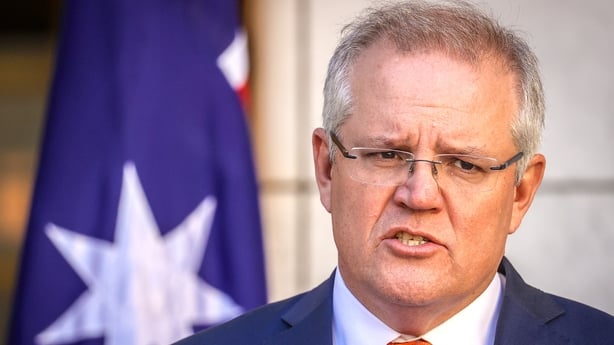US President Joe Biden and French President Emmanuel Macron will talk on the phone in the coming days amid high tension over a submarines contract, a French government spokesman said today.
The announcement comes a day after France recalled its ambassdors to Washington and Canberra, unhappy over secret US-Australia negotiations that led to the cancellation of a multi-billion Australian order for French submarines.
Earlier, Australian Prime Minister Scott Morrison said the French government would have known Canberra had "deep and grave concerns" about French submarines before the deal was torn up last week.
France is furious at Australia's decision to withdraw from a multibillion-dollar deal to build French submarines in favour of American nuclear-powered vessels, recalling its ambassadors from Canberra and Washington and accusing its allies of "lying" about their plans.
Mr Morrison said he understood the French government's "disappointment" but said he had raised issues with the deal "some months ago", as had other Australian government ministers.
"I think they would have had every reason to know that we had deep and grave concerns that the capability being delivered by the Attack Class submarine was not going to meet our strategic interests and we made very clear that we would be making a decision based on our strategic national interest," he told a press conference in Sydney.

Mr Morrison said it would have been "negligent" to proceed with the deal against intelligence and defence advice and that doing so would be counter to Australia's strategic interests.
"I don't regret the decision to put Australia's national interest first. Never will," he said.
Speaking to Sky News Australia earlier today, Defence Minister Peter Dutton said his government had been "upfront, open and honest" with France that it had concerns about the deal, which was over-budget and years behind schedule.
Mr Dutton said he understood the "French upset" but added that "suggestions that the concerns haven't been flagged by the Australian government just defy, frankly, what's on the public record and certainly what was said publicly over a long period of time".
"The government has had those concerns, we've expressed them, and we want to work very closely with the French and we'll continue to do that into the future," he said.
Mr Dutton said he had personally expressed those concerns to his French counterpart, Florence Parly, and highlighted Australia's "need to act in our national interest", which he said was acquiring the nuclear-powered submarines.
"And given the changing circumstances in the Indo-Pacific, not just now but over the coming years, we had to make a decision that was in our national interest and that's exactly what we've done," he added.
Canberra was unable to buy French nuclear-powered vessels because they require charging while the American submarines do not, making only the latter suitable for nuclear-free Australia, Mr Dutton said.
With Australia's new submarine fleet not expected to be operational for decades, Mr Dutton said the country may consider leasing or buying existing submarines from the United States or Britain in the interim.
Australia will get the nuclear-powered submarines as part of a new defence alliance announced with the United States and Britain on Wednesday, in a pact widely seen as aimed at countering the rise of China.
Britain has also sought to defend its role in the controversy.
New Foreign Secretary Liz Truss wrote in the Sunday Telegraph that the pact, announced this week, "shows our commitment to security and stability in the Indo-Pacific region" and demonstrated the government's ambition to build a "Global Britain" following its departure form the European Union.
"Our new security pact will not just make us safer at home, it could also create hundreds of new and high-skilled jobs," she wrote.
"By positioning the UK at the heart of a network of economic, diplomatic and security partnerships... we are making our country safer and more competitive, standing up for our values."
Yesterday, French government officials accused Australia of lying over the affair.
"There has been lying, duplicity, a major breach of trust and contempt. This will not do," French Foreign Minister Jean-Yves Le Drian told France 2 television.
He said a "serious crisis" was now in progress between the allies after Paris recalled its ambassadors to Canberra and Washington.
He also lashed out at the "permanent opportunism" of the British government, which he dismissed as the "third wheel" in the security pact with Australia and the United States.
NATO would have to take account of what has happened as it reconsiders future strategy, he added.

